Comparative Analysis of Ethical Approaches in Business Context
VerifiedAdded on 2022/11/29
|11
|2552
|242
Essay
AI Summary
This essay provides a detailed overview of seven ethical approaches: Utilitarianism & Negative Utilitarianism, The Golden Rule, The Categorical Imperative, Virtue Ethics, Nash’s Covenantal Business Ethics, Damon’s Four Dimensions of Business Morality, and Christian Ethics for Business. Each approach is defined and analyzed, with a focus on its strengths and weaknesses. The essay then offers a comparative analysis, highlighting the practical application and potential limitations of each theory within a business context. Ultimately, the paper concludes by identifying Damon’s Four Dimensions of Business as well as Hill’s Christian Ethic for Business as the most appropriate ethical approaches, offering justification for this selection based on their applicability and fewer weaknesses in a workplace environment. The essay emphasizes the importance of ethics in decision-making and the development of moral character in business practices. The document is contributed by a student to be published on the website Desklib, a platform which provides all the necessary AI based study tools for students.
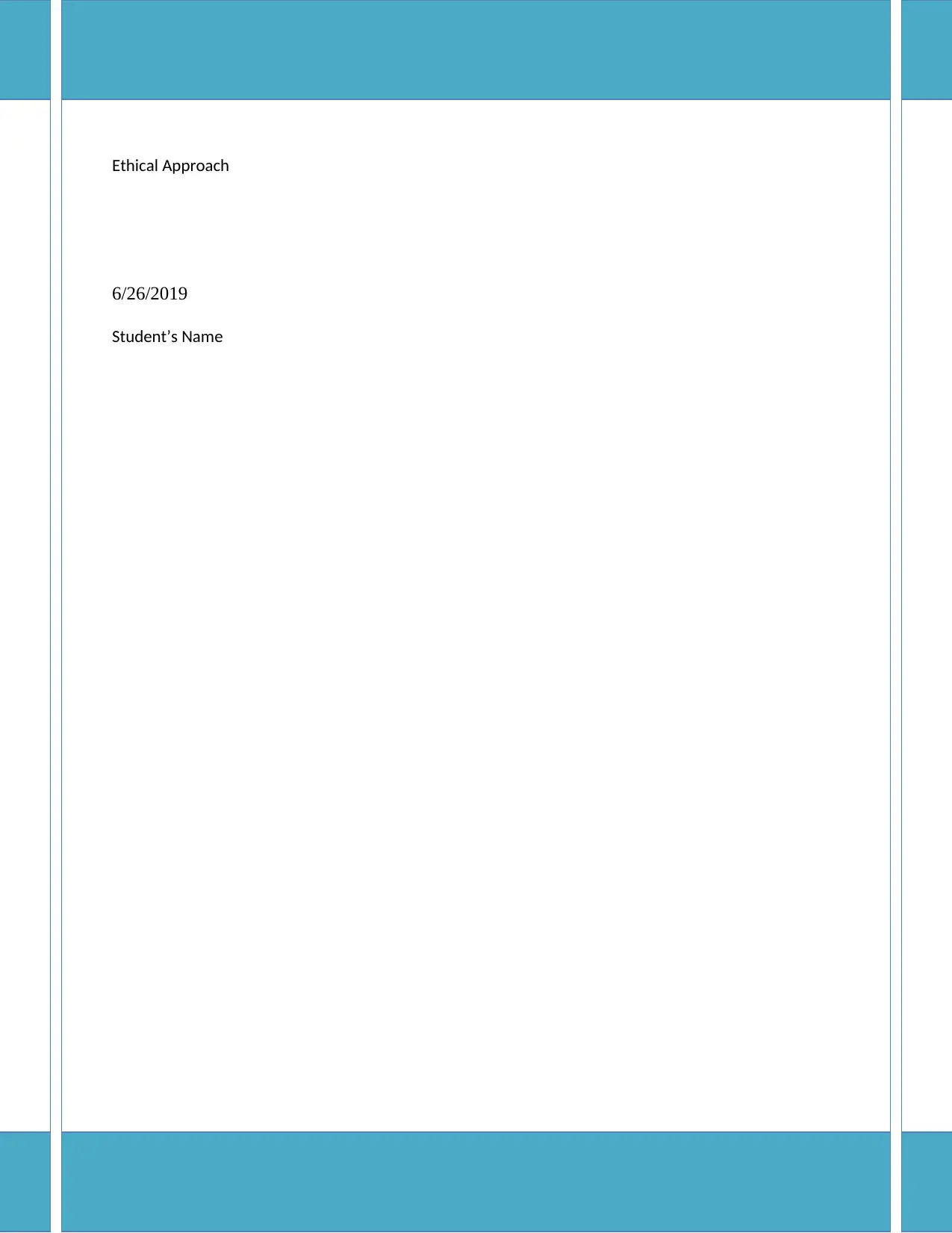
Running Head: BUSINESS AND CORPORATION LAW 0
Ethical Approach
6/26/2019
Student’s Name
Ethical Approach
6/26/2019
Student’s Name
Paraphrase This Document
Need a fresh take? Get an instant paraphrase of this document with our AI Paraphraser
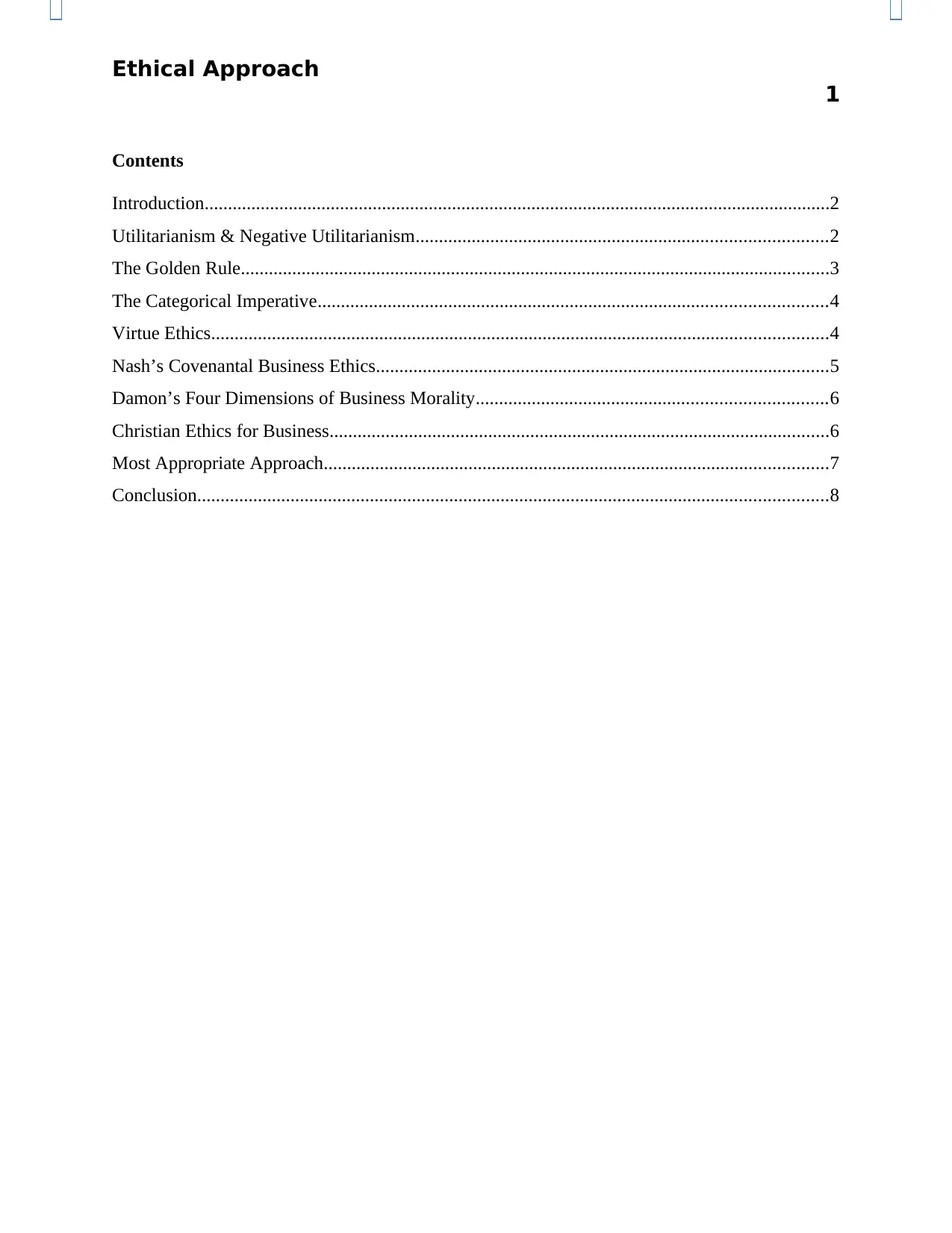
Ethical Approach
1
Contents
Introduction......................................................................................................................................2
Utilitarianism & Negative Utilitarianism........................................................................................2
The Golden Rule..............................................................................................................................3
The Categorical Imperative.............................................................................................................4
Virtue Ethics....................................................................................................................................4
Nash’s Covenantal Business Ethics.................................................................................................5
Damon’s Four Dimensions of Business Morality...........................................................................6
Christian Ethics for Business...........................................................................................................6
Most Appropriate Approach............................................................................................................7
Conclusion.......................................................................................................................................8
1
Contents
Introduction......................................................................................................................................2
Utilitarianism & Negative Utilitarianism........................................................................................2
The Golden Rule..............................................................................................................................3
The Categorical Imperative.............................................................................................................4
Virtue Ethics....................................................................................................................................4
Nash’s Covenantal Business Ethics.................................................................................................5
Damon’s Four Dimensions of Business Morality...........................................................................6
Christian Ethics for Business...........................................................................................................6
Most Appropriate Approach............................................................................................................7
Conclusion.......................................................................................................................................8
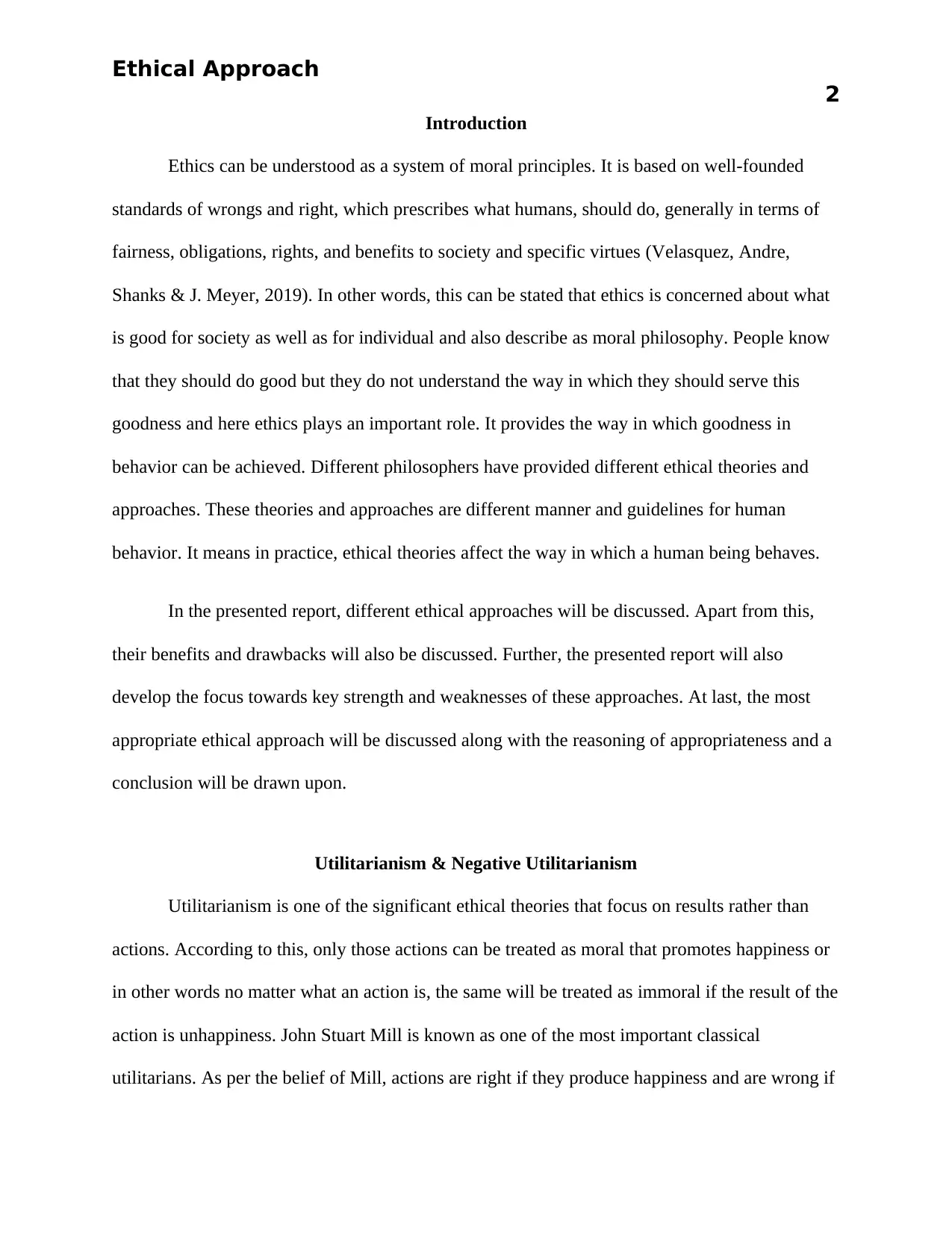
Ethical Approach
2
Introduction
Ethics can be understood as a system of moral principles. It is based on well-founded
standards of wrongs and right, which prescribes what humans, should do, generally in terms of
fairness, obligations, rights, and benefits to society and specific virtues (Velasquez, Andre,
Shanks & J. Meyer, 2019). In other words, this can be stated that ethics is concerned about what
is good for society as well as for individual and also describe as moral philosophy. People know
that they should do good but they do not understand the way in which they should serve this
goodness and here ethics plays an important role. It provides the way in which goodness in
behavior can be achieved. Different philosophers have provided different ethical theories and
approaches. These theories and approaches are different manner and guidelines for human
behavior. It means in practice, ethical theories affect the way in which a human being behaves.
In the presented report, different ethical approaches will be discussed. Apart from this,
their benefits and drawbacks will also be discussed. Further, the presented report will also
develop the focus towards key strength and weaknesses of these approaches. At last, the most
appropriate ethical approach will be discussed along with the reasoning of appropriateness and a
conclusion will be drawn upon.
Utilitarianism & Negative Utilitarianism
Utilitarianism is one of the significant ethical theories that focus on results rather than
actions. According to this, only those actions can be treated as moral that promotes happiness or
in other words no matter what an action is, the same will be treated as immoral if the result of the
action is unhappiness. John Stuart Mill is known as one of the most important classical
utilitarians. As per the belief of Mill, actions are right if they produce happiness and are wrong if
2
Introduction
Ethics can be understood as a system of moral principles. It is based on well-founded
standards of wrongs and right, which prescribes what humans, should do, generally in terms of
fairness, obligations, rights, and benefits to society and specific virtues (Velasquez, Andre,
Shanks & J. Meyer, 2019). In other words, this can be stated that ethics is concerned about what
is good for society as well as for individual and also describe as moral philosophy. People know
that they should do good but they do not understand the way in which they should serve this
goodness and here ethics plays an important role. It provides the way in which goodness in
behavior can be achieved. Different philosophers have provided different ethical theories and
approaches. These theories and approaches are different manner and guidelines for human
behavior. It means in practice, ethical theories affect the way in which a human being behaves.
In the presented report, different ethical approaches will be discussed. Apart from this,
their benefits and drawbacks will also be discussed. Further, the presented report will also
develop the focus towards key strength and weaknesses of these approaches. At last, the most
appropriate ethical approach will be discussed along with the reasoning of appropriateness and a
conclusion will be drawn upon.
Utilitarianism & Negative Utilitarianism
Utilitarianism is one of the significant ethical theories that focus on results rather than
actions. According to this, only those actions can be treated as moral that promotes happiness or
in other words no matter what an action is, the same will be treated as immoral if the result of the
action is unhappiness. John Stuart Mill is known as one of the most important classical
utilitarians. As per the belief of Mill, actions are right if they produce happiness and are wrong if
⊘ This is a preview!⊘
Do you want full access?
Subscribe today to unlock all pages.

Trusted by 1+ million students worldwide
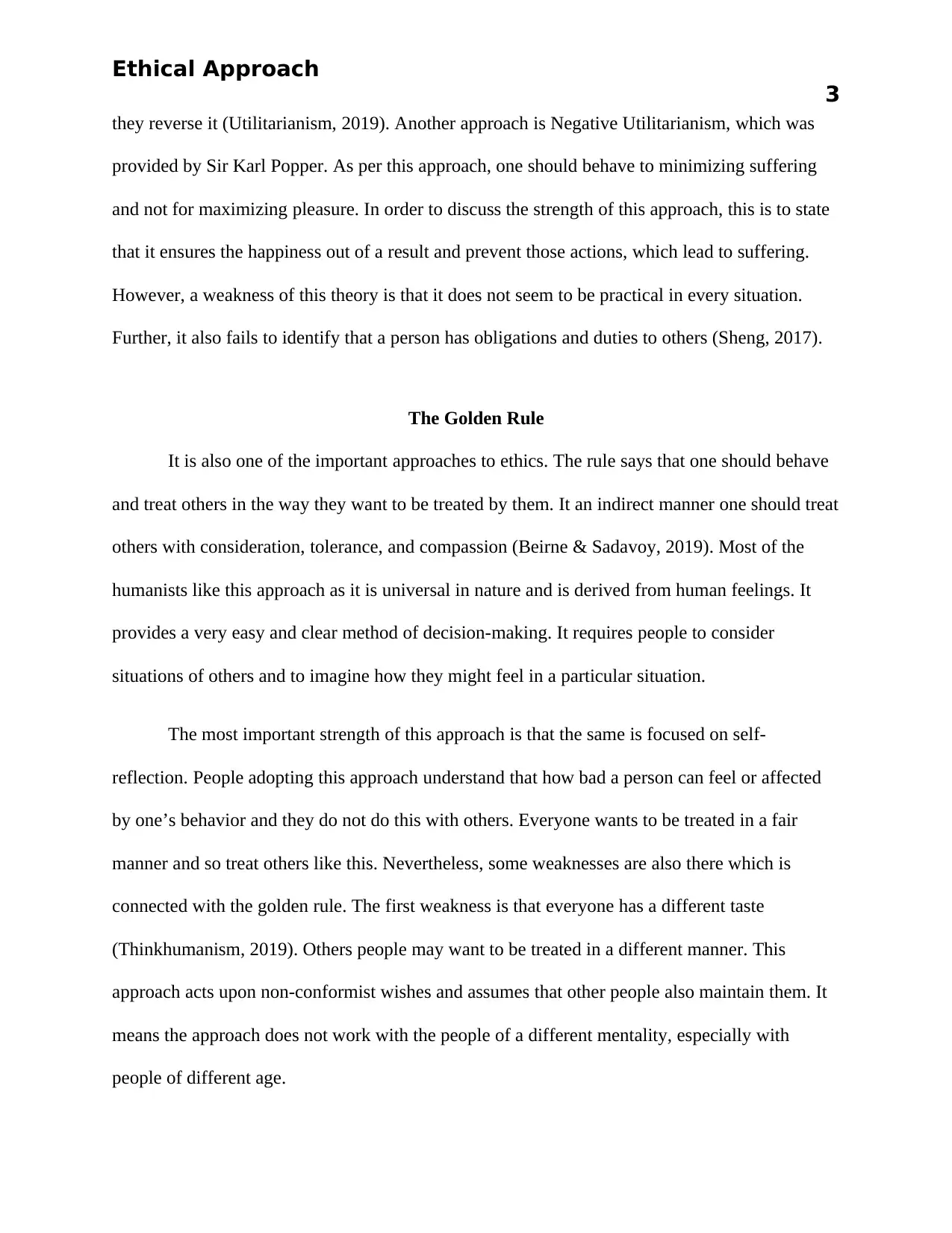
Ethical Approach
3
they reverse it (Utilitarianism, 2019). Another approach is Negative Utilitarianism, which was
provided by Sir Karl Popper. As per this approach, one should behave to minimizing suffering
and not for maximizing pleasure. In order to discuss the strength of this approach, this is to state
that it ensures the happiness out of a result and prevent those actions, which lead to suffering.
However, a weakness of this theory is that it does not seem to be practical in every situation.
Further, it also fails to identify that a person has obligations and duties to others (Sheng, 2017).
The Golden Rule
It is also one of the important approaches to ethics. The rule says that one should behave
and treat others in the way they want to be treated by them. It an indirect manner one should treat
others with consideration, tolerance, and compassion (Beirne & Sadavoy, 2019). Most of the
humanists like this approach as it is universal in nature and is derived from human feelings. It
provides a very easy and clear method of decision-making. It requires people to consider
situations of others and to imagine how they might feel in a particular situation.
The most important strength of this approach is that the same is focused on self-
reflection. People adopting this approach understand that how bad a person can feel or affected
by one’s behavior and they do not do this with others. Everyone wants to be treated in a fair
manner and so treat others like this. Nevertheless, some weaknesses are also there which is
connected with the golden rule. The first weakness is that everyone has a different taste
(Thinkhumanism, 2019). Others people may want to be treated in a different manner. This
approach acts upon non-conformist wishes and assumes that other people also maintain them. It
means the approach does not work with the people of a different mentality, especially with
people of different age.
3
they reverse it (Utilitarianism, 2019). Another approach is Negative Utilitarianism, which was
provided by Sir Karl Popper. As per this approach, one should behave to minimizing suffering
and not for maximizing pleasure. In order to discuss the strength of this approach, this is to state
that it ensures the happiness out of a result and prevent those actions, which lead to suffering.
However, a weakness of this theory is that it does not seem to be practical in every situation.
Further, it also fails to identify that a person has obligations and duties to others (Sheng, 2017).
The Golden Rule
It is also one of the important approaches to ethics. The rule says that one should behave
and treat others in the way they want to be treated by them. It an indirect manner one should treat
others with consideration, tolerance, and compassion (Beirne & Sadavoy, 2019). Most of the
humanists like this approach as it is universal in nature and is derived from human feelings. It
provides a very easy and clear method of decision-making. It requires people to consider
situations of others and to imagine how they might feel in a particular situation.
The most important strength of this approach is that the same is focused on self-
reflection. People adopting this approach understand that how bad a person can feel or affected
by one’s behavior and they do not do this with others. Everyone wants to be treated in a fair
manner and so treat others like this. Nevertheless, some weaknesses are also there which is
connected with the golden rule. The first weakness is that everyone has a different taste
(Thinkhumanism, 2019). Others people may want to be treated in a different manner. This
approach acts upon non-conformist wishes and assumes that other people also maintain them. It
means the approach does not work with the people of a different mentality, especially with
people of different age.
Paraphrase This Document
Need a fresh take? Get an instant paraphrase of this document with our AI Paraphraser
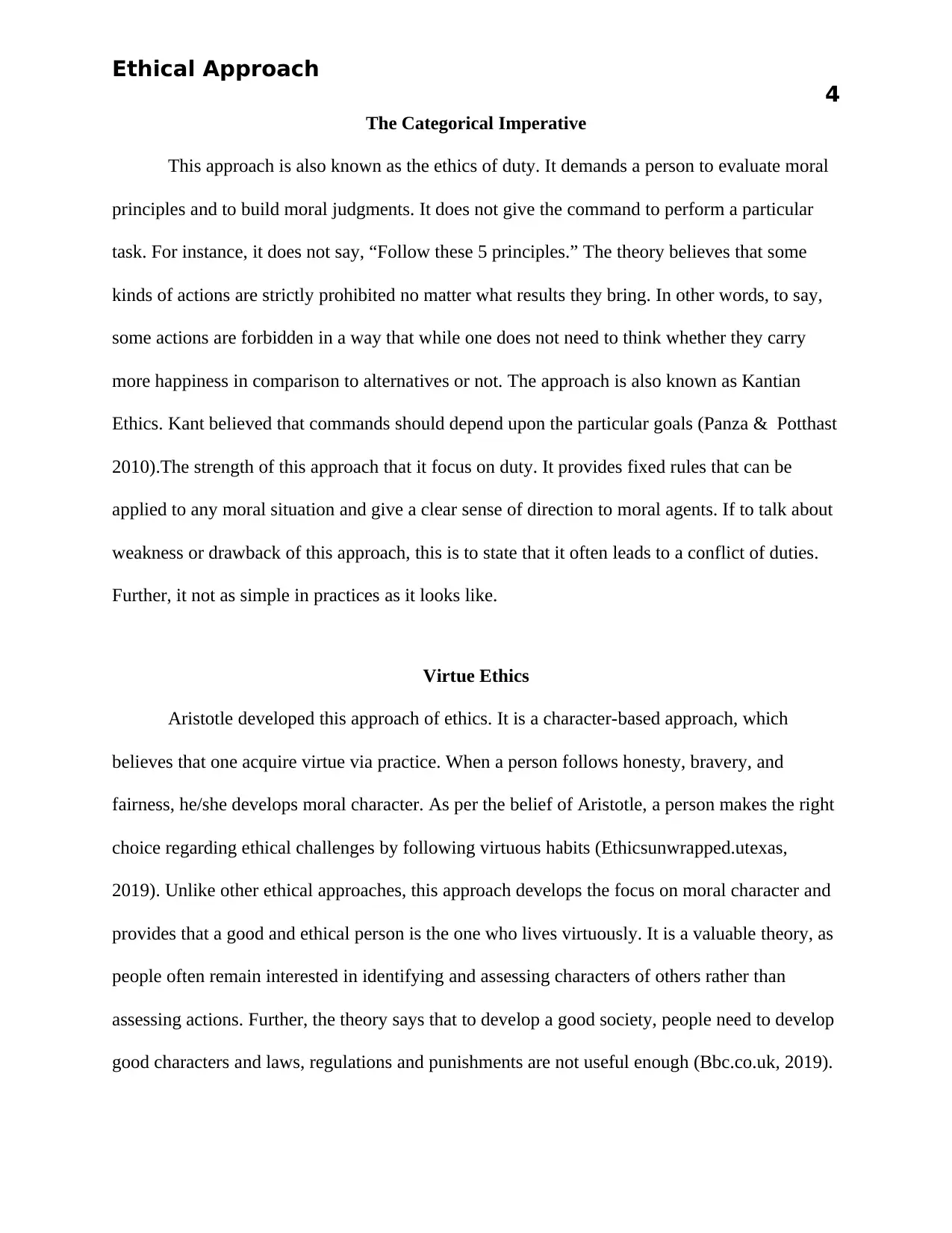
Ethical Approach
4
The Categorical Imperative
This approach is also known as the ethics of duty. It demands a person to evaluate moral
principles and to build moral judgments. It does not give the command to perform a particular
task. For instance, it does not say, “Follow these 5 principles.” The theory believes that some
kinds of actions are strictly prohibited no matter what results they bring. In other words, to say,
some actions are forbidden in a way that while one does not need to think whether they carry
more happiness in comparison to alternatives or not. The approach is also known as Kantian
Ethics. Kant believed that commands should depend upon the particular goals (Panza & Potthast
2010).The strength of this approach that it focus on duty. It provides fixed rules that can be
applied to any moral situation and give a clear sense of direction to moral agents. If to talk about
weakness or drawback of this approach, this is to state that it often leads to a conflict of duties.
Further, it not as simple in practices as it looks like.
Virtue Ethics
Aristotle developed this approach of ethics. It is a character-based approach, which
believes that one acquire virtue via practice. When a person follows honesty, bravery, and
fairness, he/she develops moral character. As per the belief of Aristotle, a person makes the right
choice regarding ethical challenges by following virtuous habits (Ethicsunwrapped.utexas,
2019). Unlike other ethical approaches, this approach develops the focus on moral character and
provides that a good and ethical person is the one who lives virtuously. It is a valuable theory, as
people often remain interested in identifying and assessing characters of others rather than
assessing actions. Further, the theory says that to develop a good society, people need to develop
good characters and laws, regulations and punishments are not useful enough (Bbc.co.uk, 2019).
4
The Categorical Imperative
This approach is also known as the ethics of duty. It demands a person to evaluate moral
principles and to build moral judgments. It does not give the command to perform a particular
task. For instance, it does not say, “Follow these 5 principles.” The theory believes that some
kinds of actions are strictly prohibited no matter what results they bring. In other words, to say,
some actions are forbidden in a way that while one does not need to think whether they carry
more happiness in comparison to alternatives or not. The approach is also known as Kantian
Ethics. Kant believed that commands should depend upon the particular goals (Panza & Potthast
2010).The strength of this approach that it focus on duty. It provides fixed rules that can be
applied to any moral situation and give a clear sense of direction to moral agents. If to talk about
weakness or drawback of this approach, this is to state that it often leads to a conflict of duties.
Further, it not as simple in practices as it looks like.
Virtue Ethics
Aristotle developed this approach of ethics. It is a character-based approach, which
believes that one acquire virtue via practice. When a person follows honesty, bravery, and
fairness, he/she develops moral character. As per the belief of Aristotle, a person makes the right
choice regarding ethical challenges by following virtuous habits (Ethicsunwrapped.utexas,
2019). Unlike other ethical approaches, this approach develops the focus on moral character and
provides that a good and ethical person is the one who lives virtuously. It is a valuable theory, as
people often remain interested in identifying and assessing characters of others rather than
assessing actions. Further, the theory says that to develop a good society, people need to develop
good characters and laws, regulations and punishments are not useful enough (Bbc.co.uk, 2019).
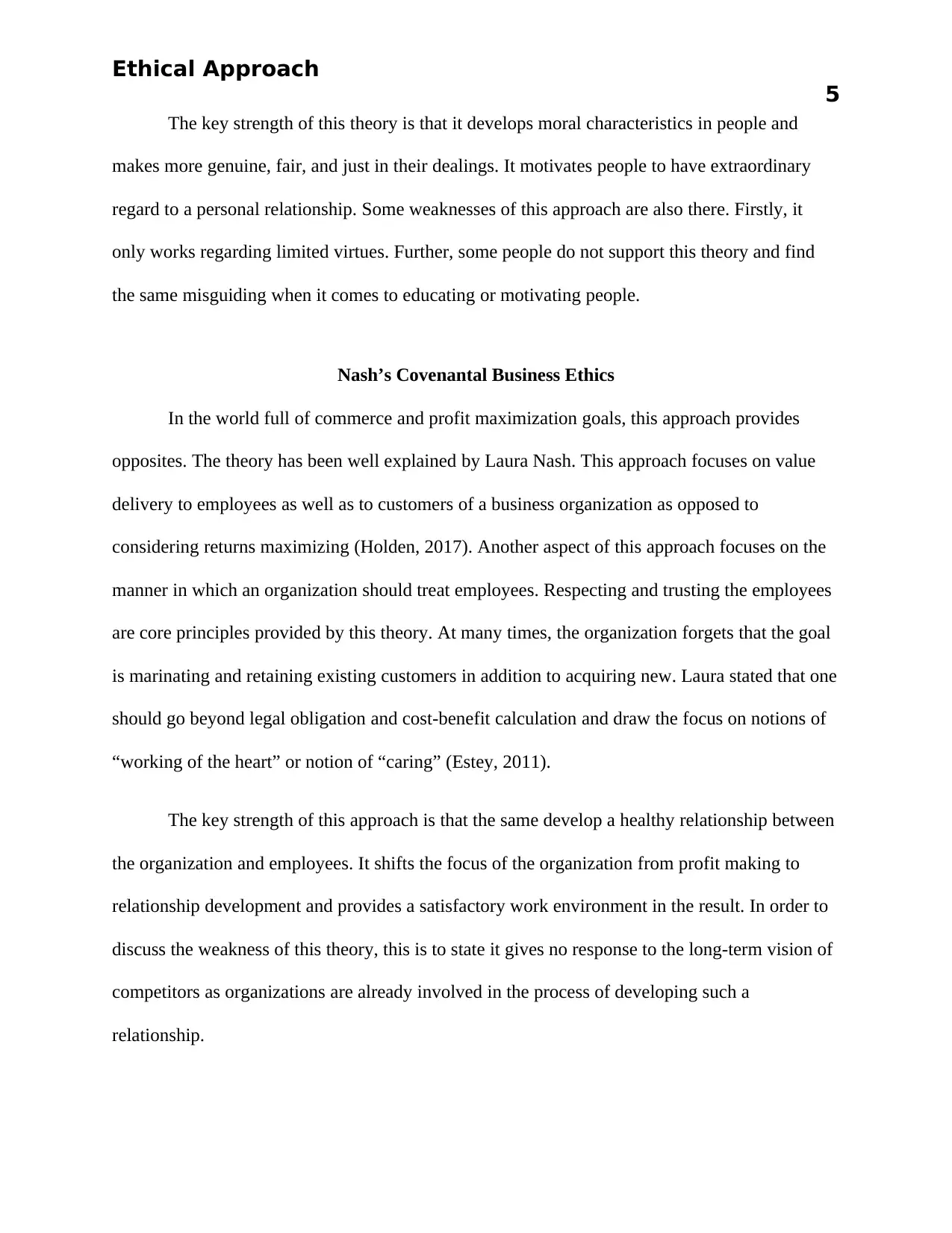
Ethical Approach
5
The key strength of this theory is that it develops moral characteristics in people and
makes more genuine, fair, and just in their dealings. It motivates people to have extraordinary
regard to a personal relationship. Some weaknesses of this approach are also there. Firstly, it
only works regarding limited virtues. Further, some people do not support this theory and find
the same misguiding when it comes to educating or motivating people.
Nash’s Covenantal Business Ethics
In the world full of commerce and profit maximization goals, this approach provides
opposites. The theory has been well explained by Laura Nash. This approach focuses on value
delivery to employees as well as to customers of a business organization as opposed to
considering returns maximizing (Holden, 2017). Another aspect of this approach focuses on the
manner in which an organization should treat employees. Respecting and trusting the employees
are core principles provided by this theory. At many times, the organization forgets that the goal
is marinating and retaining existing customers in addition to acquiring new. Laura stated that one
should go beyond legal obligation and cost-benefit calculation and draw the focus on notions of
“working of the heart” or notion of “caring” (Estey, 2011).
The key strength of this approach is that the same develop a healthy relationship between
the organization and employees. It shifts the focus of the organization from profit making to
relationship development and provides a satisfactory work environment in the result. In order to
discuss the weakness of this theory, this is to state it gives no response to the long-term vision of
competitors as organizations are already involved in the process of developing such a
relationship.
5
The key strength of this theory is that it develops moral characteristics in people and
makes more genuine, fair, and just in their dealings. It motivates people to have extraordinary
regard to a personal relationship. Some weaknesses of this approach are also there. Firstly, it
only works regarding limited virtues. Further, some people do not support this theory and find
the same misguiding when it comes to educating or motivating people.
Nash’s Covenantal Business Ethics
In the world full of commerce and profit maximization goals, this approach provides
opposites. The theory has been well explained by Laura Nash. This approach focuses on value
delivery to employees as well as to customers of a business organization as opposed to
considering returns maximizing (Holden, 2017). Another aspect of this approach focuses on the
manner in which an organization should treat employees. Respecting and trusting the employees
are core principles provided by this theory. At many times, the organization forgets that the goal
is marinating and retaining existing customers in addition to acquiring new. Laura stated that one
should go beyond legal obligation and cost-benefit calculation and draw the focus on notions of
“working of the heart” or notion of “caring” (Estey, 2011).
The key strength of this approach is that the same develop a healthy relationship between
the organization and employees. It shifts the focus of the organization from profit making to
relationship development and provides a satisfactory work environment in the result. In order to
discuss the weakness of this theory, this is to state it gives no response to the long-term vision of
competitors as organizations are already involved in the process of developing such a
relationship.
⊘ This is a preview!⊘
Do you want full access?
Subscribe today to unlock all pages.

Trusted by 1+ million students worldwide
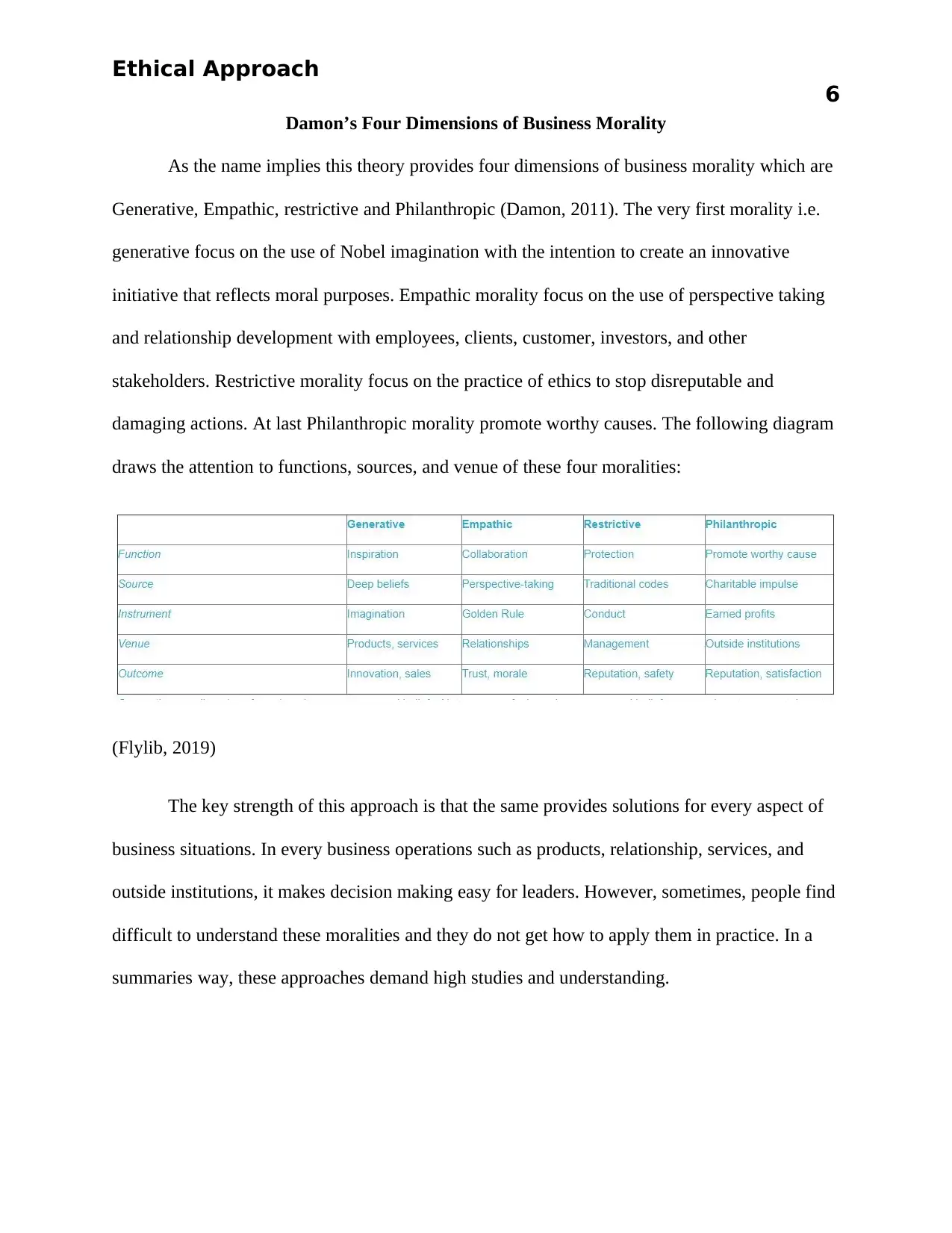
Ethical Approach
6
Damon’s Four Dimensions of Business Morality
As the name implies this theory provides four dimensions of business morality which are
Generative, Empathic, restrictive and Philanthropic (Damon, 2011). The very first morality i.e.
generative focus on the use of Nobel imagination with the intention to create an innovative
initiative that reflects moral purposes. Empathic morality focus on the use of perspective taking
and relationship development with employees, clients, customer, investors, and other
stakeholders. Restrictive morality focus on the practice of ethics to stop disreputable and
damaging actions. At last Philanthropic morality promote worthy causes. The following diagram
draws the attention to functions, sources, and venue of these four moralities:
(Flylib, 2019)
The key strength of this approach is that the same provides solutions for every aspect of
business situations. In every business operations such as products, relationship, services, and
outside institutions, it makes decision making easy for leaders. However, sometimes, people find
difficult to understand these moralities and they do not get how to apply them in practice. In a
summaries way, these approaches demand high studies and understanding.
6
Damon’s Four Dimensions of Business Morality
As the name implies this theory provides four dimensions of business morality which are
Generative, Empathic, restrictive and Philanthropic (Damon, 2011). The very first morality i.e.
generative focus on the use of Nobel imagination with the intention to create an innovative
initiative that reflects moral purposes. Empathic morality focus on the use of perspective taking
and relationship development with employees, clients, customer, investors, and other
stakeholders. Restrictive morality focus on the practice of ethics to stop disreputable and
damaging actions. At last Philanthropic morality promote worthy causes. The following diagram
draws the attention to functions, sources, and venue of these four moralities:
(Flylib, 2019)
The key strength of this approach is that the same provides solutions for every aspect of
business situations. In every business operations such as products, relationship, services, and
outside institutions, it makes decision making easy for leaders. However, sometimes, people find
difficult to understand these moralities and they do not get how to apply them in practice. In a
summaries way, these approaches demand high studies and understanding.
Paraphrase This Document
Need a fresh take? Get an instant paraphrase of this document with our AI Paraphraser
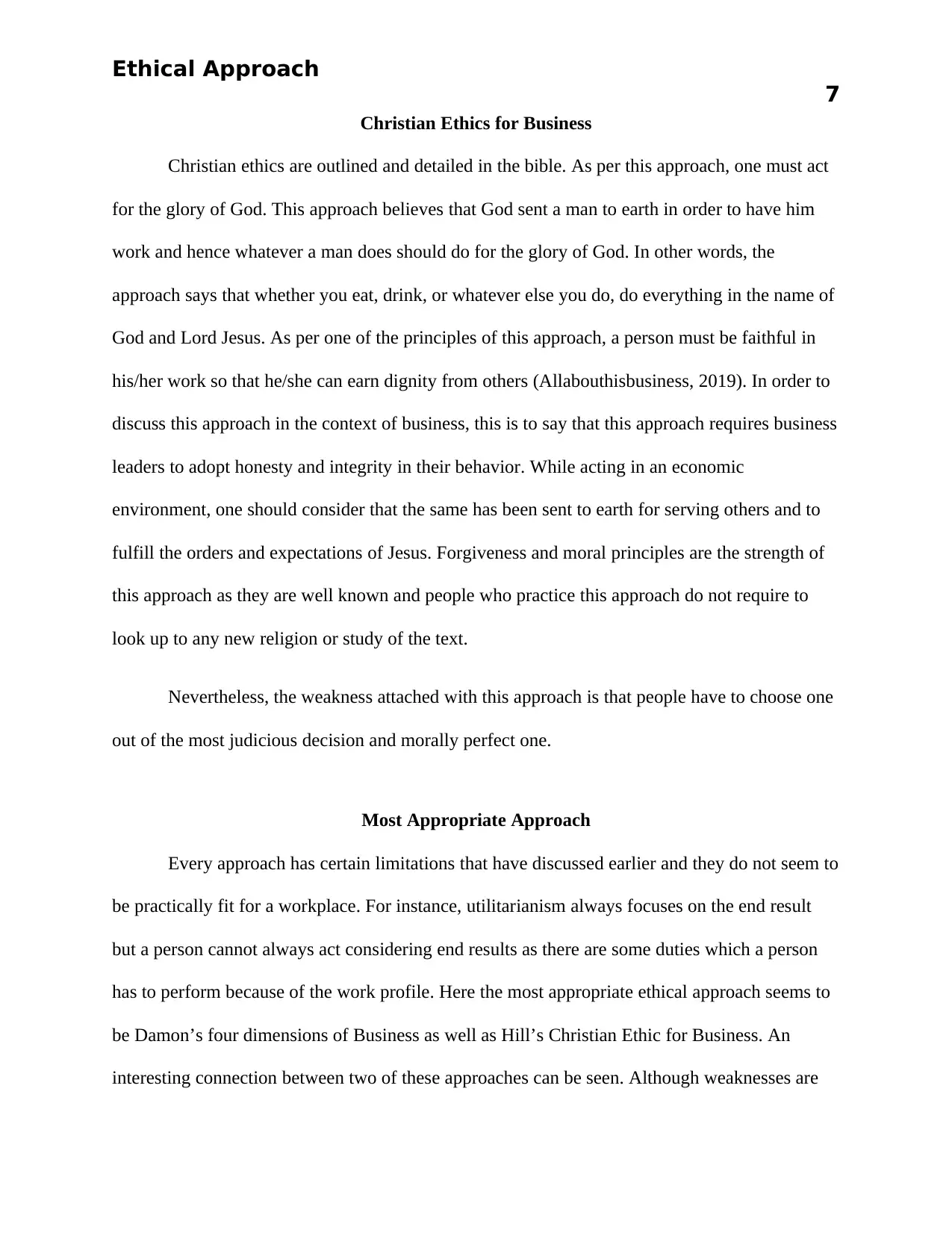
Ethical Approach
7
Christian Ethics for Business
Christian ethics are outlined and detailed in the bible. As per this approach, one must act
for the glory of God. This approach believes that God sent a man to earth in order to have him
work and hence whatever a man does should do for the glory of God. In other words, the
approach says that whether you eat, drink, or whatever else you do, do everything in the name of
God and Lord Jesus. As per one of the principles of this approach, a person must be faithful in
his/her work so that he/she can earn dignity from others (Allabouthisbusiness, 2019). In order to
discuss this approach in the context of business, this is to say that this approach requires business
leaders to adopt honesty and integrity in their behavior. While acting in an economic
environment, one should consider that the same has been sent to earth for serving others and to
fulfill the orders and expectations of Jesus. Forgiveness and moral principles are the strength of
this approach as they are well known and people who practice this approach do not require to
look up to any new religion or study of the text.
Nevertheless, the weakness attached with this approach is that people have to choose one
out of the most judicious decision and morally perfect one.
Most Appropriate Approach
Every approach has certain limitations that have discussed earlier and they do not seem to
be practically fit for a workplace. For instance, utilitarianism always focuses on the end result
but a person cannot always act considering end results as there are some duties which a person
has to perform because of the work profile. Here the most appropriate ethical approach seems to
be Damon’s four dimensions of Business as well as Hill’s Christian Ethic for Business. An
interesting connection between two of these approaches can be seen. Although weaknesses are
7
Christian Ethics for Business
Christian ethics are outlined and detailed in the bible. As per this approach, one must act
for the glory of God. This approach believes that God sent a man to earth in order to have him
work and hence whatever a man does should do for the glory of God. In other words, the
approach says that whether you eat, drink, or whatever else you do, do everything in the name of
God and Lord Jesus. As per one of the principles of this approach, a person must be faithful in
his/her work so that he/she can earn dignity from others (Allabouthisbusiness, 2019). In order to
discuss this approach in the context of business, this is to say that this approach requires business
leaders to adopt honesty and integrity in their behavior. While acting in an economic
environment, one should consider that the same has been sent to earth for serving others and to
fulfill the orders and expectations of Jesus. Forgiveness and moral principles are the strength of
this approach as they are well known and people who practice this approach do not require to
look up to any new religion or study of the text.
Nevertheless, the weakness attached with this approach is that people have to choose one
out of the most judicious decision and morally perfect one.
Most Appropriate Approach
Every approach has certain limitations that have discussed earlier and they do not seem to
be practically fit for a workplace. For instance, utilitarianism always focuses on the end result
but a person cannot always act considering end results as there are some duties which a person
has to perform because of the work profile. Here the most appropriate ethical approach seems to
be Damon’s four dimensions of Business as well as Hill’s Christian Ethic for Business. An
interesting connection between two of these approaches can be seen. Although weaknesses are
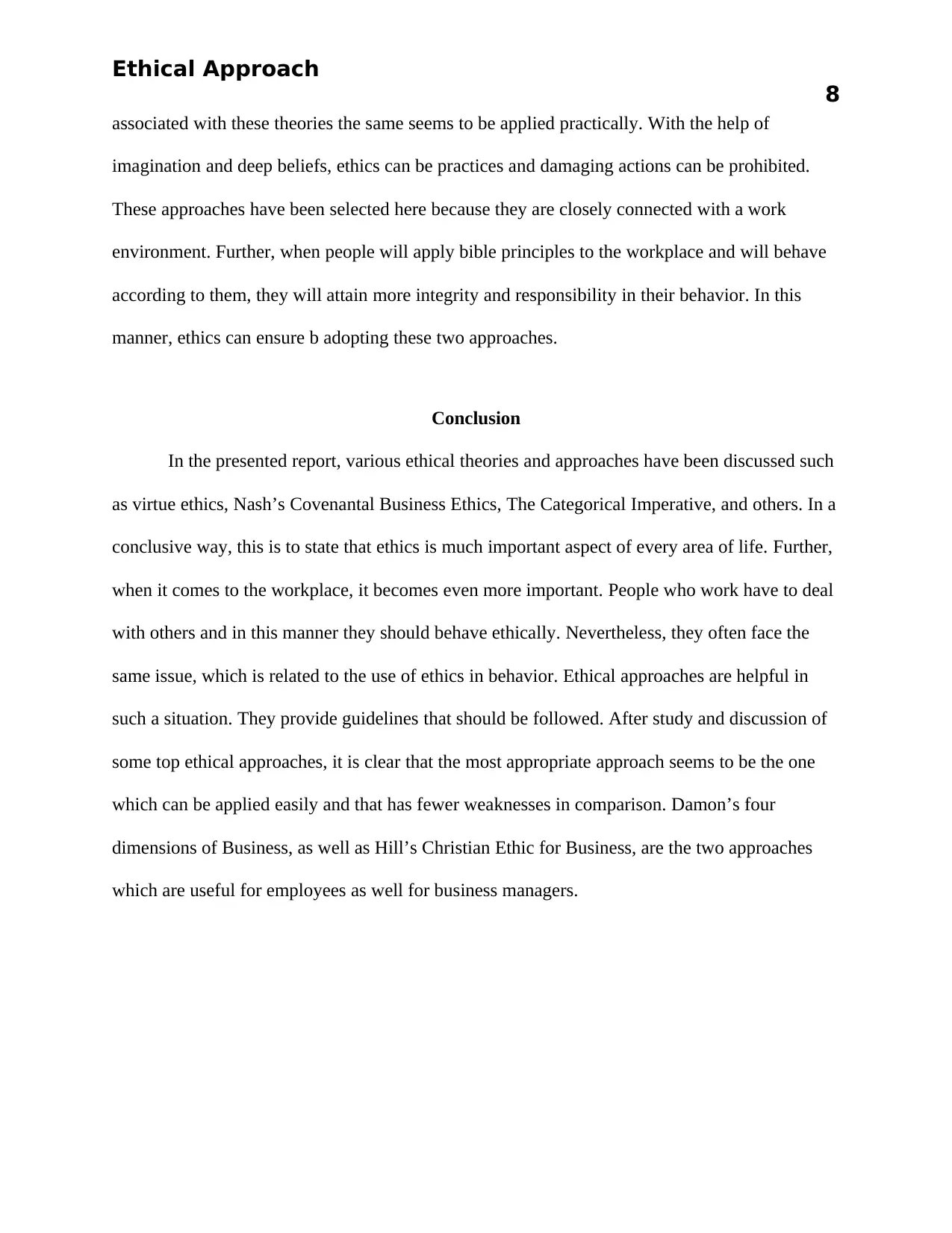
Ethical Approach
8
associated with these theories the same seems to be applied practically. With the help of
imagination and deep beliefs, ethics can be practices and damaging actions can be prohibited.
These approaches have been selected here because they are closely connected with a work
environment. Further, when people will apply bible principles to the workplace and will behave
according to them, they will attain more integrity and responsibility in their behavior. In this
manner, ethics can ensure b adopting these two approaches.
Conclusion
In the presented report, various ethical theories and approaches have been discussed such
as virtue ethics, Nash’s Covenantal Business Ethics, The Categorical Imperative, and others. In a
conclusive way, this is to state that ethics is much important aspect of every area of life. Further,
when it comes to the workplace, it becomes even more important. People who work have to deal
with others and in this manner they should behave ethically. Nevertheless, they often face the
same issue, which is related to the use of ethics in behavior. Ethical approaches are helpful in
such a situation. They provide guidelines that should be followed. After study and discussion of
some top ethical approaches, it is clear that the most appropriate approach seems to be the one
which can be applied easily and that has fewer weaknesses in comparison. Damon’s four
dimensions of Business, as well as Hill’s Christian Ethic for Business, are the two approaches
which are useful for employees as well for business managers.
8
associated with these theories the same seems to be applied practically. With the help of
imagination and deep beliefs, ethics can be practices and damaging actions can be prohibited.
These approaches have been selected here because they are closely connected with a work
environment. Further, when people will apply bible principles to the workplace and will behave
according to them, they will attain more integrity and responsibility in their behavior. In this
manner, ethics can ensure b adopting these two approaches.
Conclusion
In the presented report, various ethical theories and approaches have been discussed such
as virtue ethics, Nash’s Covenantal Business Ethics, The Categorical Imperative, and others. In a
conclusive way, this is to state that ethics is much important aspect of every area of life. Further,
when it comes to the workplace, it becomes even more important. People who work have to deal
with others and in this manner they should behave ethically. Nevertheless, they often face the
same issue, which is related to the use of ethics in behavior. Ethical approaches are helpful in
such a situation. They provide guidelines that should be followed. After study and discussion of
some top ethical approaches, it is clear that the most appropriate approach seems to be the one
which can be applied easily and that has fewer weaknesses in comparison. Damon’s four
dimensions of Business, as well as Hill’s Christian Ethic for Business, are the two approaches
which are useful for employees as well for business managers.
⊘ This is a preview!⊘
Do you want full access?
Subscribe today to unlock all pages.

Trusted by 1+ million students worldwide
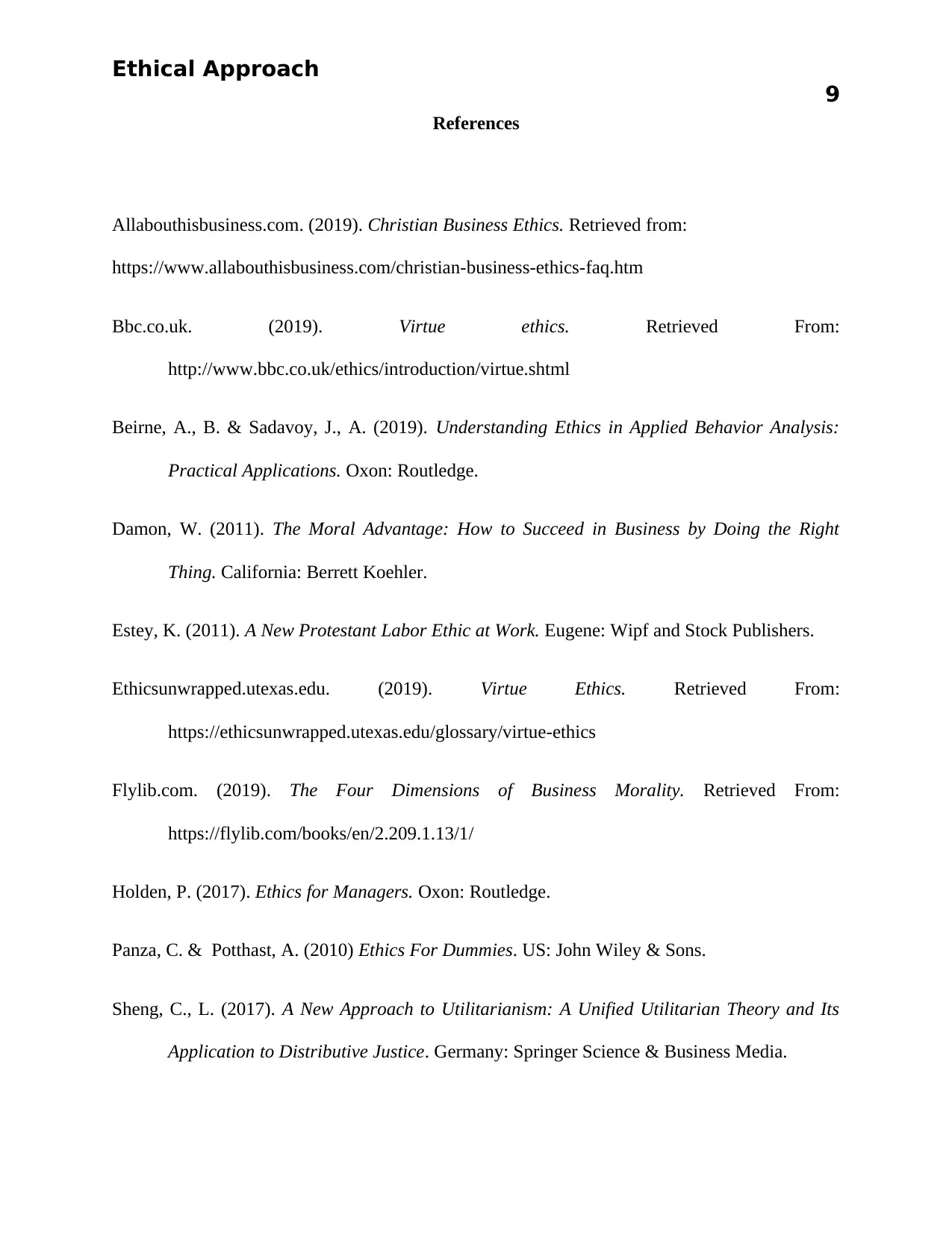
Ethical Approach
9
References
Allabouthisbusiness.com. (2019). Christian Business Ethics. Retrieved from:
https://www.allabouthisbusiness.com/christian-business-ethics-faq.htm
Bbc.co.uk. (2019). Virtue ethics. Retrieved From:
http://www.bbc.co.uk/ethics/introduction/virtue.shtml
Beirne, A., B. & Sadavoy, J., A. (2019). Understanding Ethics in Applied Behavior Analysis:
Practical Applications. Oxon: Routledge.
Damon, W. (2011). The Moral Advantage: How to Succeed in Business by Doing the Right
Thing. California: Berrett Koehler.
Estey, K. (2011). A New Protestant Labor Ethic at Work. Eugene: Wipf and Stock Publishers.
Ethicsunwrapped.utexas.edu. (2019). Virtue Ethics. Retrieved From:
https://ethicsunwrapped.utexas.edu/glossary/virtue-ethics
Flylib.com. (2019). The Four Dimensions of Business Morality. Retrieved From:
https://flylib.com/books/en/2.209.1.13/1/
Holden, P. (2017). Ethics for Managers. Oxon: Routledge.
Panza, C. & Potthast, A. (2010) Ethics For Dummies. US: John Wiley & Sons.
Sheng, C., L. (2017). A New Approach to Utilitarianism: A Unified Utilitarian Theory and Its
Application to Distributive Justice. Germany: Springer Science & Business Media.
9
References
Allabouthisbusiness.com. (2019). Christian Business Ethics. Retrieved from:
https://www.allabouthisbusiness.com/christian-business-ethics-faq.htm
Bbc.co.uk. (2019). Virtue ethics. Retrieved From:
http://www.bbc.co.uk/ethics/introduction/virtue.shtml
Beirne, A., B. & Sadavoy, J., A. (2019). Understanding Ethics in Applied Behavior Analysis:
Practical Applications. Oxon: Routledge.
Damon, W. (2011). The Moral Advantage: How to Succeed in Business by Doing the Right
Thing. California: Berrett Koehler.
Estey, K. (2011). A New Protestant Labor Ethic at Work. Eugene: Wipf and Stock Publishers.
Ethicsunwrapped.utexas.edu. (2019). Virtue Ethics. Retrieved From:
https://ethicsunwrapped.utexas.edu/glossary/virtue-ethics
Flylib.com. (2019). The Four Dimensions of Business Morality. Retrieved From:
https://flylib.com/books/en/2.209.1.13/1/
Holden, P. (2017). Ethics for Managers. Oxon: Routledge.
Panza, C. & Potthast, A. (2010) Ethics For Dummies. US: John Wiley & Sons.
Sheng, C., L. (2017). A New Approach to Utilitarianism: A Unified Utilitarian Theory and Its
Application to Distributive Justice. Germany: Springer Science & Business Media.
Paraphrase This Document
Need a fresh take? Get an instant paraphrase of this document with our AI Paraphraser
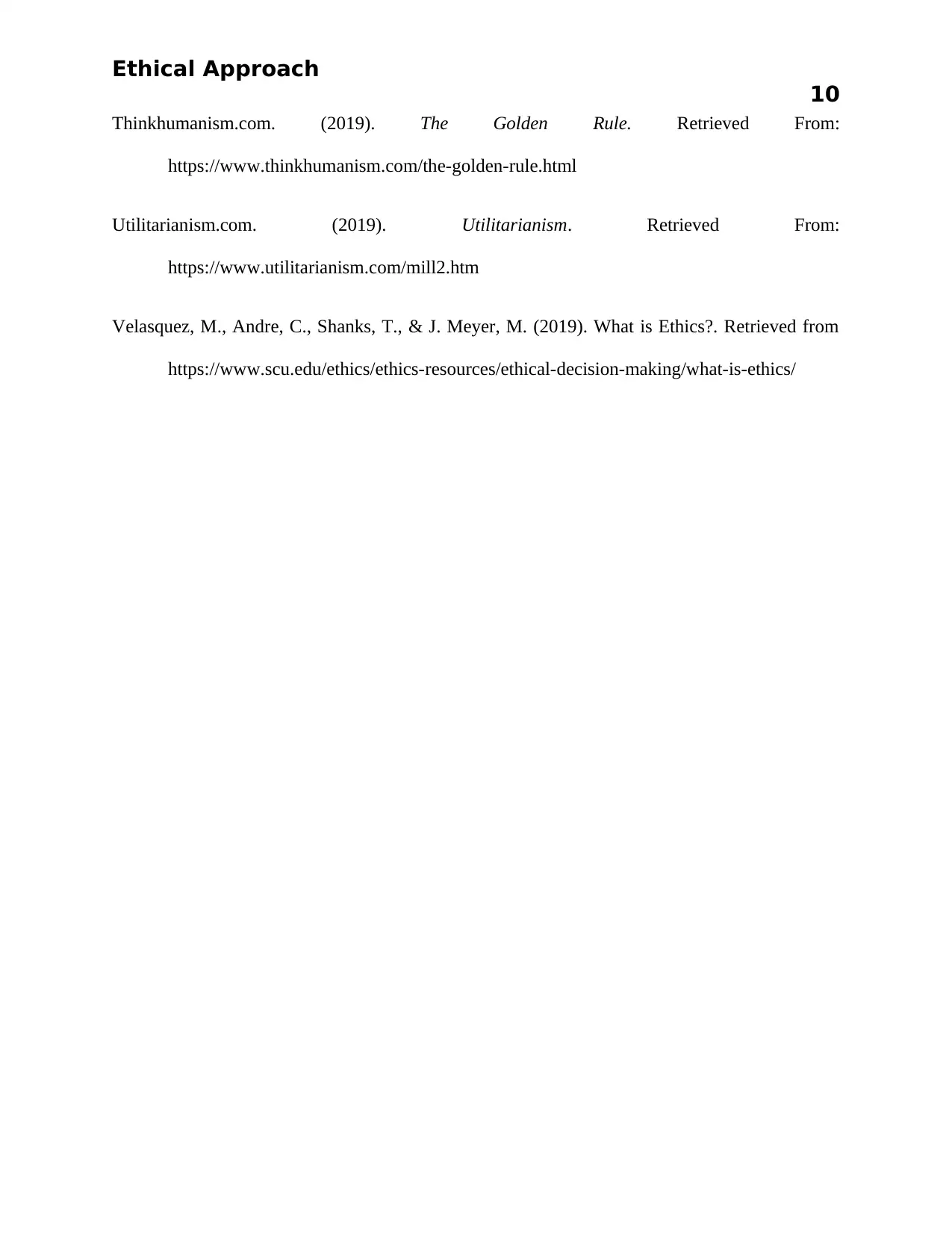
Ethical Approach
10
Thinkhumanism.com. (2019). The Golden Rule. Retrieved From:
https://www.thinkhumanism.com/the-golden-rule.html
Utilitarianism.com. (2019). Utilitarianism. Retrieved From:
https://www.utilitarianism.com/mill2.htm
Velasquez, M., Andre, C., Shanks, T., & J. Meyer, M. (2019). What is Ethics?. Retrieved from
https://www.scu.edu/ethics/ethics-resources/ethical-decision-making/what-is-ethics/
10
Thinkhumanism.com. (2019). The Golden Rule. Retrieved From:
https://www.thinkhumanism.com/the-golden-rule.html
Utilitarianism.com. (2019). Utilitarianism. Retrieved From:
https://www.utilitarianism.com/mill2.htm
Velasquez, M., Andre, C., Shanks, T., & J. Meyer, M. (2019). What is Ethics?. Retrieved from
https://www.scu.edu/ethics/ethics-resources/ethical-decision-making/what-is-ethics/
1 out of 11
Related Documents
Your All-in-One AI-Powered Toolkit for Academic Success.
+13062052269
info@desklib.com
Available 24*7 on WhatsApp / Email
![[object Object]](/_next/static/media/star-bottom.7253800d.svg)
Unlock your academic potential
Copyright © 2020–2026 A2Z Services. All Rights Reserved. Developed and managed by ZUCOL.





